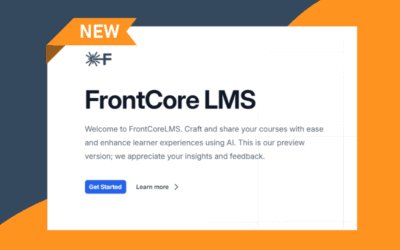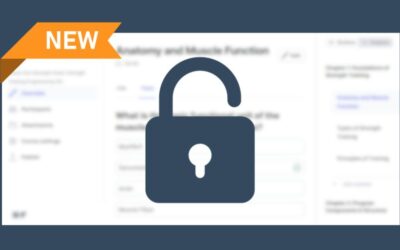What are the benefits of online learning?

Whether you are in charge of internal upskilling at your workplace or you are a professional course provider, online learning has the potential to be a gamechanger. Your course participants will likely experience a better learning outcome because e-learning gives them the freedom to personalise the learning process. However, digital learning might negatively impact motivation and accountability. Therefore, efficient strategies for achieving learning outcomes require insight into the advantages and disadvantages of online learning. That is what we are going to explore in this article.
What is e-learning?
First of all, what is online learning? Online learning is a digital way of training employees, teaching students or carrying out courses for partners and customers. It is a method for organising learning and training sessions that takes advantage of digital resources. Whether you are an instructor or a professional course provider, online learning enables you to design a course structure that is less dependent on a physical classroom and strict timetables. Instead, course participants can do the course whenever and wherever they want. This is made possible through electronic devices such as computers, tablets and smartphones. Therefore, e-learning opens up new opportunities for delivering high-quality and engaging learning sessions.
Advantages of online learning
Learning is a normal part of people’s everyday life, whether at the workplace or in personal life. Online learning represents a great opportunity for learning, and it can be an efficient method for not neglecting upskilling and development. It is an easy and comfortable way of achieving knowledge in a variety of fields, and there are several advantages to implementing online learning. Let us deep-dive into the most prevalent ones together:
1. It is flexible
Online learning provides more flexibility. Course participants have several options to choose from, including where, when and how you take the course. Online learning enables them to learn from the train or from the comfort of their home. In addition, they can schedule the course after their other engagements, either social or professional.
2. It reduces costs
You are not dependent on having an instructor show up in person, at a certain place or time. Therefore, you do not tie up resources in engaging and paying an instructor to come teach. There are no location-related costs either.
3. It frees up your time
Related to cutting costs, you are reducing the amount of time and resources you spend on planning for learning sessions. When the course is digital, the set-up is ready to go. It is far more streamlined compared to traditional classroom teaching, where there can be more room for error.
4. Learning become more personalized
People do not learn at the same speed or format. Many are in fact challenged by the traditional physical-space teaching methods. By introducing e-learning, it is possible to tailor the course structure in a way that accounts for different needs. Communication online enables more or better discussions and collaborative efforts, because the participant feels safer in the place they are taking the course.

Ditch the office and do an online course at your favorite café.
Disadvantages of online learning
As always, there is a flip side to the coin. Therefore, it is crucial to be aware of the potential disadvantages of online learning:
1. You lack face-to-face interaction
When everything is made online, your course participants inevitably lose the human connection with you. You cannot interact with people face-to-face in the same way as they have become used to in traditional learning settings.
2. There is a chance for technical difficulties
Since the course is online, you are prone to technical difficulties. No matter where you sit, there is always a chance that something goes wrong. This goes for the instructor as well as the participants. Since you are dependent on accessing the internet, you risk being hindered from accessing or participating in classes.
3. They might feel less motivated and supported
A characteristic of online learning is that the participants are learning on their own terms. A potential drawback to this is that they lose motivation throughout the course. Put yourself in their shoes; if you struggle with maintaining focus or staying engaged throughout the session, there is not anyone to challenge you to keep up the hard work. In that case, it is crucial that your instructor supports you even from afar.
4. They can experience more isolation
Neither the instructor or the participants are physically present and the risk of feeling less connected to your peers or colleagues, might leave you with a sense of isolation. It is true that you do not have access to a natural interaction with others. This leaves especially the course participant with the responsibility to garner social connections online or create them outside of the course. This will likely improve learning outcomes, because it becomes an arena for informal, but related discussions on the topic.
Different types of e-learning
There are many scenarios for when e-learning becomes relevant. If you are a professional course provider or are responsible for upskilling internally in your company, you should consider using online learning as a tool.
E-learning for course providers
As a course provider, you spend much time on designing and structuring a course catalog for various businesses. By offering online courses in addition to traditional courses, you give them several options. By having a varied and flexible offering, you easily create a road map for specific needs that exist within a company.
- You are a professional course provider: As a course provider, you can offer both regular and online courses.
- You offer external coursing services: You can take advantage of the skill sets of professional course instructors and engage them to create and organize courses for businesses.
E-learning for internal upskilling
If you are in charge of internal upskilling, you are designing and structuring learning and training models, where e-learning might be just the thing for you and your colleagues.
- You are planning employee training: If you are in charge of onboarding new employees, you can make development and learning a natural part of the process by including e-learning tools.
- You provide opportunities for Internal up-skilling: Are you in charge of upskilling, you can take the role of a course facilitator and create courses for your colleagues.

Don’t lose sight of your goal if you’re doing e-learning at home.
The potential impact of online learning
E-learning is potentially impactful, both for the individual course participant and for the revenue of a company. The individual benefits of online learning are related to gaining more and new knowledge and confidence within a field, and the company benefits will be an increase in retention and revenue. If your employees improve their skills sets, they become more motivated and engaged, which likely will improve efficiency and productivity.
Interested in how online learning can improve the learning outcome? Give blended learning a go.
Interested in facilitating e-learning courses? You need an e-learning tool
If you want to give digital learning a go, you need a system that enables it. Dependent on who you are and which responsibilities you have for training and learning, you can take advantage of different digital learning tools.
E-learning tools for course providers
If you are a professional course provider, you are probably familiar with how a training management system works. A training management system (TMS) automates administrative tasks and creates a better overview of all the courses you offer. It is a great way for you to optimise internal processes and enhance efficiency through participant management, online registration and instructor onboarding. But, oftentimes you can integrate it with a learning management system (LMS) as well. This is a learning platform where you can design and organize digital learning sessions, which facilitate online courses.
E-learning tools for internal upskilling
If you work with upskilling internally in your organisation, you can engage a professional course provider or organize your own upskilling training sessions. For the latter, you can use a learning management system (LMS). In the learning platform you design courses that people can watch, engage with and explore anywhere, anytime. A LMS enables you to create a virtual online sphere for training and learning, which gives you the ability to offer your colleagues flexible training sessions.
Explore the FrontCore learning platform
In FrontCore we offer both TMS and LMS. You can use our learning management system (LMS) to simplify and boost e-learning efforts. This is a tool you can use for in-house training, which allows you to build online courses that can be organised however you like.
The potential benefits of online learning makes it worth a try
Online learning is a complement and extension of the traditional learning methods. It is not possible to achieve the same human connection and hold the same type of passionate discussions that face-to-face interaction can. Having said that, there is potential for online learning to improve productivity. The learning process becomes more personalised when it is digital. You have the opportunity to structure your schedule on your own terms and decide when and where you learn, based on when and where you are most productive. For that reason alone, e-learning is worth the try, especially combined with traditional learning opportunities.
Did you like this article? Don't forget to share it:
About FrontCore
Over 3700 training providers use solutions from FrontCore – and that’s not without reason. FrontCore is one of Norway’s leading competence environments within cloud based systems for Training Management, Learning Management and Webmarketing. With over 23 years of experience from the training industry and our finger on the market pulse continuously, we help course and training providers achieve more efficiency and higher revenue.
Products

Related articles
Blended learning: What is it, and why should I as a course provider know about it?
Unlock the potential of blended learning! Discover how combining digital tools with traditional teaching transforms courses. Implement it effectively, engage learners, and enhance your educational programs for optimal results today!
Discover the New Era of E-Learning with FrontCore’s Officially Launched LMS
It’s here. We’re launching FrontCore LMS: A user-friendly, AI-enhanced learning management platform for modern e-learning. Experience intuitive design and innovative features with FrontCore’s new LMS. Start your next-gen e-learning journey today!
Unlock the Future of E-learning – The Next-Gen LMS Preview is Now Live!
Ready to elevate your e-learning game? FrontCore is launching a groundbreaking LMS that will not only change the way you create e-learning but also focuses on maximizing learning outcomes. Test the pre-launch version and be a part of shaping the future of e-learning!








0 Comments